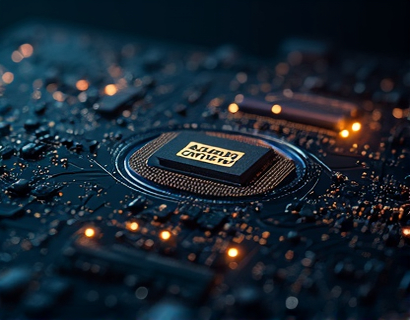Exploring the Synergy of Crypto and AI: A New Era of Digital Transformation
The intersection of cryptocurrency and artificial intelligence (AI) is giving birth to a new paradigm in digital technology, one that promises to revolutionize how we interact with digital solutions. This synergy is not just about combining two powerful technologies but about creating a synergistic effect that enhances user experiences, secures transactions, and opens up new possibilities for innovation. As we delve into this topic, we will explore how the integration of crypto and AI is transforming various sectors, from finance to marketing, and what this means for the future of digital strategies.
The Foundations of Cryptocurrency and AI
To understand the synergy between crypto and AI, it's essential to first grasp the fundamentals of each technology. Cryptocurrency, since its inception with Bitcoin in 2009, has introduced a decentralized and secure method of conducting financial transactions without the need for intermediaries like banks. The underlying technology, blockchain, ensures transparency, immutability, and security through a distributed ledger system.
Artificial intelligence, on the other hand, involves the simulation of human intelligence processes by machines, particularly computer systems. These processes include learning (the acquisition of information and rules for using it), reasoning (using rules to reach approximate or definite conclusions), and self-correction. AI's capabilities range from simple data analysis to complex decision-making, making it a versatile tool across various industries.
Enhancing Security with AI in Crypto
One of the most significant benefits of merging AI with cryptocurrency is the enhancement of security measures. Traditional cybersecurity methods are often inadequate against the sophisticated attacks seen in the digital realm. AI can analyze vast amounts of data in real-time, identifying patterns and anomalies that indicate potential threats. For instance, machine learning algorithms can detect fraudulent transactions by learning from historical data and adapting to new tactics used by cybercriminals.
Smart contracts, a cornerstone of blockchain technology, can also be fortified with AI. These self-executing contracts with the terms directly written into code can incorporate AI-driven conditions that adapt to changing environments, ensuring that transactions are not only secure but also efficient and responsive to real-world conditions.
Optimizing User Experiences Through AI
The integration of AI in cryptocurrency extends beyond security to significantly enhance user experiences. AI-driven chatbots and virtual assistants can provide 24/7 customer support, answering queries and guiding users through complex processes with ease. These AI entities can understand natural language, making interactions more intuitive and user-friendly.
Personalization is another area where AI shines. By analyzing user behavior and preferences, AI can tailor recommendations for crypto assets, investment strategies, and even content. This level of personalization not only improves user satisfaction but also increases engagement and loyalty to platforms that leverage these technologies.
Innovative Applications in Finance
The finance sector is one of the most impacted by the crypto-AI synergy. Decentralized Finance (DeFi) platforms are leveraging AI to create more efficient and accessible financial services. AI algorithms can predict market trends, optimize trading strategies, and manage risks more effectively than traditional methods. This not only benefits institutional investors but also democratizes access to sophisticated financial tools for individual users.
Stablecoins, which aim to maintain a stable value, can be managed more dynamically with AI. These algorithms can adjust the supply of stablecoins based on market conditions, ensuring stability without the need for manual intervention. This automation reduces human error and increases the reliability of stablecoins as a store of value and medium of exchange.
Transforming Marketing and Advertising
In the realm of marketing and advertising, the combination of crypto and AI is redefining how brands connect with their audiences. Cryptocurrency offers a transparent and secure way to handle transactions, while AI provides the tools to analyze vast datasets and create highly targeted campaigns. AI-driven analytics can predict consumer behavior, optimize ad placements, and measure campaign effectiveness with unprecedented precision.
Moreover, the use of non-fungible tokens (NFTs) in marketing is an emerging trend. NFTs, secured by blockchain, can represent unique digital assets such as artwork, collectibles, or even exclusive content. AI can help in creating and managing these NFTs, ensuring they are authentic and valuable. This fusion opens new revenue streams for brands and creators alike.
Challenges and Considerations
While the potential of combining crypto and AI is vast, there are challenges that need to be addressed. Regulatory uncertainty remains a significant hurdle, as both crypto and AI operate in areas that are still evolving in terms of legal frameworks. Ensuring compliance while innovating is crucial for any organization venturing into this space.
Another consideration is the technical complexity involved in integrating these technologies. Developing robust systems that can handle the computational demands of AI while maintaining the security and efficiency of blockchain requires expertise and resources. However, as the technology matures, these barriers are expected to diminish.
The Future Landscape
Looking ahead, the synergy between crypto and AI is poised to drive further innovation and transformation. As more organizations recognize the benefits of this combination, we can expect to see a proliferation of advanced applications across various industries. From supply chain management to healthcare, the potential applications are vast.
The future may also see the emergence of decentralized AI networks, where AI models are trained and run on a blockchain-based infrastructure. This would not only enhance privacy and security but also enable more collaborative and transparent AI development. The concept of AI as a service, delivered through decentralized platforms, could become a reality, making cutting-edge AI tools accessible to a broader audience.
Conclusion
The convergence of cryptocurrency and AI represents a powerful force in the digital world, offering solutions that are more secure, efficient, and user-centric. As this synergy continues to evolve, it will undoubtedly shape the future of digital strategies, providing innovators and businesses with new tools to connect, engage, and thrive in an increasingly complex technological landscape.










































